Albania 2009
The Foolhardy Driver's Guide to Albania
I was looking for somewhere to go that was a bit different and where no-one had been. Albania came to mind. I asked around, and could not find anyone who had been there or anyone who had the slightest desire to go. Most people did not know where it was, but they knew it was full of criminals and was generally unpleasant and dangerous. Sounded like just the place I was looking for.
Further investigation on the internet suggested that it was not quite as bad as everyone seemed to think. The Foreign Office website contained the usual references to terrorism, swine flu, dangerous driving, etc. It also advised against going to the north east because of ordnance left over from the war with Kosovo, and mentioned that visitors should bear in mind the high level of gun ownership. On the other hand, the Albanian government's own website presented the country as a tourist's paradise, with beautiful scenery and rich in culture.
Apart from a brief section in the Lonely Planet Guide to Eastern Europe there are only two English language guides to Albania. One, published by Bradt, has been around for a long time, and other is a very recent book by Thomas Cook. I bought the latter one because it is cheaper, smaller and very up-to-date. In perusing the guide books I came across a few memorable statements:
"If you are thinking of hiring a car, our advice is - don't. However, for the foolhardy here are the addresses……………" Lonely Planet
"Just because a street exists in Albania doesn't mean it has to have a name, and even if it does have a name it doesn't necessarily follow that anyone knows what the name is. This is the state of affairs throughout more or less the entire country…….." Thomas Cook
"Driving in Albania is the rally enthusiast's dream and a prudent driver's nightmare." Thomas Cook
"Just because every room comes with a Jacuzzi doesn't necessarily mean there'll be hot water to put in it……" Thomas Cook
One oft-repeated piece of advice about visiting Albania was to take a torch, as power cuts are frequent. One guide suggested taking candles as well, for the longer blackouts in country areas. A related piece of information was that in some food establishments when the freezer thaws out due to power failure they do not throw the food away, they just refreeze it and serve it up at a later date.
Armed with all this information you can imagine that I was really looking forward to my trip. The only direct flights between Britain and Albania are with British Airways from Gatwick, and there were flights on my preferred dates, so I booked on the internet.
The plan was to fly out on a Thursday, and stay for 2 nights in a hotel near the airport. According to all reports driving in Tirana would result in certain death, so I was proposing to go into the city by public transport (reputedly an unreliable bus service) and spend Friday looking round. On the Saturday morning I would collect a rental car at the airport and drive around the country for 3 days, flying home on Monday evening.
Albania Hotels.com listed 2 hotels within walking distance of the airport, one being €20 per night, and the other €30. On the basis that I would be less disappointed when it turned out to be dreadful I was going to book the cheaper one, but it was being renovated, so I had to go for the Verzaci at €30 (paid in US dollars).
In the departure lounge at Gatwick it was interesting to see what sort of people were going to Albania. There were probably about 120, mostly not British, and around 80% of them were men. It was hard to say how many might be drug dealers or other types of criminal, but on the whole they were not as formidable looking as I had expected. At Tirana there were two immigration queues, one for Albanians and one for foreigners. Rather surprisingly, the queues were of approximately equal length, although most of the 'foreigners' were not British.
The nice lady from AlbaniaHotels.com had told me by email that I could get a taxi to the hotel for €5, but as it was only 200m from the airport I might prefer to walk. As I came out of the airport I was besieged by men shouting "taxi" but ignored them and got directions to the hotel from a man in uniform. It was dark, but I started to walk, when a taxi driver asked me where I was going. When I told him he said I couldn't walk because it was 1km and there were no lights on the road. I said I was going to walk anyway. After about 200 yards the taxi pulled alongside me and the driver said it was dangerous to walk. Looking at the road ahead I was inclined to think he was right, so I got in. In fact, it was about 500m, but there were no lights or pavement. He drove at 20mph, to try to create the impression that it was 1km and justify his €5 fee.
The hotel was fairly new and generally ok, although the people hardly spoke any English. My room was very hot and when I went to go out on to the balcony the double-glazed door practically fell out of its frame and I had to lift it bodily to close it again. There was, however, good air-conditioning, once I found out how to work it. The breakfast consisted of a rather flattened fried egg, processed meat, cheese and heavy dry bread. No drink was provided and the waiter seemed surprised when I asked for coffee.
Tirana centre is 10 miles from the airport, and contrary to what I had expected the 10 o'clock bus departed dead on time, with just myself and one other passenger on board. I sat behind the driver to get a good view of the hair-raising antics of the local drivers, and was not disappointed. After half an hour, with a near miss every 2 minutes, we arrived at the museum in the main square.
A few words here about the background to present-day Albania. For about 40 years until 1985 the country was run by a strict and ruthless dictator named Enver Hoxha. First he allied the country to Russia, then to China, and eventually fell out with everybody, leading the country into a long period of isolation. People were generally not allowed to travel around, and until 1991 there were only about 600 cars in the country. Driving licences were normally only issued to members of the Communist party. When the country was opened up in the early 1990s large numbers of well-used Mercedes cars were brought in from other parts of Europe, as they were considered to be the only cars that would stand up to the bad roads. People taught themselves to drive in a somewhat spirited manner and the country became known as Mercedesland.
The first thing you notice today is the enormous number of Mercedes vehicles on the road, accounting for about 60% of the total, and many are quite recent, a lot of them with British number plates. Allegedly these have been bought in Britain by Albanians, but you have to wonder how many were stolen. Presumably they are more or less outside the law, like foreign registered cars here, and they are driven even more furiously than the ones with local numbers. Considering that Albania is supposed to be the poorest country in Europe, the number of large expensive cars on the road is quite astonishing.
By the end of the Hoxha period Tirana was a very grey, drab city, and as soon as his influence waned there was an official policy to paint the buildings in bright colours, and that has been quite successful. For a capital city there are not a great many sights of interest, but a lot has been done to tidy the place up and remove the worst eyesores of Hoxha' s reign. The place where his statue stood in the main square is now a paved area where youngsters ride around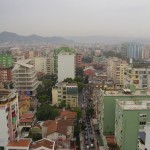 on quad bikes, a good
on quad bikes, a good 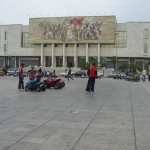 way of showing contempt for a hated
way of showing contempt for a hated 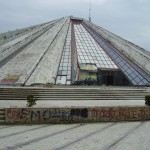 dictator. There are some fine buildings from the period of Italian influence in the early 20th century and some other public buildings that are not too grim. Hoxha had a massive pyramid built as a memorial to himself, and that has fallen into decay, but some renovation work now seems to be under way.
dictator. There are some fine buildings from the period of Italian influence in the early 20th century and some other public buildings that are not too grim. Hoxha had a massive pyramid built as a memorial to himself, and that has fallen into decay, but some renovation work now seems to be under way.
Near the centre there is an area called Bllok, which is network of shopping and business streets with quite old buildings. Many are in a poor state of repair, and if you go round the back it is a bit of a third world experience. There are clearly a large number of people living in poor conditions. All the wiring to the buildings is external, and has to be seen to be believed, with great bundles of wire wrapped round lampposts and junction boxes hanging down in mid air. There is rubbish everywhere and a fair amount of graffiti. The pavements are in poor condition and you can't just walk around as you can here. There are loose paving slabs and big uncovered holes, and I nearly fell flat on my face a couple of times. There is no regard for the needs of blind or disabled people at all.
The air quality was not as bad as I had expected, with few vehicles emitting visible fumes. Most of the heavy industry has now been shut down. The country is a smokers' paradise. Cigarettes are cheap (I bought some for a chain-smoking lady of 93) and as soon as you sit down in a restaurant someone puts an ash tray in front of you.
On the Saturday morning I checked out of the hotel and walked to the airport to collect my car, which I had booked with Avis on the internet. Because of the bad roads and reckless driving the British Foreign Office advise using a 4X4, but as they don't offer to pay for it I had reserved a Chevolet Matiz , the cheapest car on the list. Still quite expensive to hire, presumably because cars don't last long in Albania.
The airport car rental counters are open only on request, and the car was brought from the Avis city centre depot by a smartly dressed man who spoke good English. The Matiz had turned into an Opel Corsa diesel, in excellent condition apart from a badly cracked driver's door mirror.
I set off northwards, intending to take a long inland route through the mountains to Shkoder, the second largest city. Within a few miles I had my first experience of Albanian drivers. On the approach to a major junction with an expressway there was a single file queue of traffic. Nothing moved for while, so cars and lorries started driving along the inside, on a muddy layby. Then more people came from behind, and squeezed along the inside of the people who had already come along the inside. Then vehicles started coming along the outside, in the face of the little traffic that was getting through from the opposite direction. Then more vehicles came along the outside of the ones that had already come along the outside, blocking the road completely. Police sirens were sounding, and there was a lot of horn blowing, but nothing happened for a long time. Eventually the traffic crawled forward, and at the junction there were two policia, furiously blowing their whistles and waving their batons.
After an hour I had travelled 6 miles, and I decided to alter my plan and go to a noted mountain village called Krujë that was not very far, and then take a more direct route to Shkoder, using older main roads passing through towns and villages. The road to Krujë was bad, but made much worse by a stretch of roadworks with deep yellow mud through which cars and lorries were swerving all across the road to avoid the huge potholes. Krujë had a castle and was quite attractive. From the map there appeared to be a short cut across to the main road to the north, but all I could find was a rough track, so I had to retrace my route through the roadworks.
Without too much difficulty I found the old road to Shkoder, but after a couple miles there was a junction with a bumpy road going straight on and a well-surfaced road branching to the right. I assumed that that was the main road, but after a mile I finished up at the entrance to a cement works!
The road continued with various degrees of bumpiness for the next 30 miles, to a town called Lezhë, after which the road had been upgraded. Apart from the potholes there were unmarked speed humps and gullies across the road, and at times I could only travel at walking pace.
Along the way I came to a town called Lac, which was, I think, the real Albania. The main road was lined with businesses of all sorts, largely motor trade, and there was an area with 15 or 20 minibuses waiting for customers. Set back from the road was a line of seedy-looking bars and betting shops, full of gangsters, drug dealers and money launderers. There were men tearing around in big Mercedes, suddenly stopping in the middle of the road to talk to someone they knew. I did not see any guns, but I have no doubt that there were plenty around. There were a few modern shops and a rather run-down street market. I tried to find a place where I could get a cup of coffee and a piece of cake, but that was far too twee for Lac. In the end I bought a thing that was a cross between a trifle and custard tart from a baker's shop, and only managed to eat half of it. Perhaps I should stick to Baden-Baden.
An 18-year-old fire engine was recently donated to Lac by the people of Camborne in Cornwall. One of the firemen who went with it to show the locals how to use it was quoted as saying "they've got absolutely nothing over there at the moment, no ladders, no pumps". If the fire engine is a Mercedes it will be amongst friends in its new home.
Driving northwards from Lac I came to a massive derelict industrial site. Apparently there were two big industrial sites in the area, a copper smelting plant and a phosphate fertilizer factory, and both were shut down about 10 years ago due to inefficiency and pollution. The pollution was so bad that people were being moved out of the area. 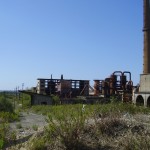 Between them they must have employed hundreds of people, and it is difficult to imagine what the people do now. Both sites have been investigated by an international body concerned with pollution, and they are both still causing problems. Chemicals from the fertilizer factory are leaching into the water supply, so when you visit Lac DON'T DRINK THE WATER.
Between them they must have employed hundreds of people, and it is difficult to imagine what the people do now. Both sites have been investigated by an international body concerned with pollution, and they are both still causing problems. Chemicals from the fertilizer factory are leaching into the water supply, so when you visit Lac DON'T DRINK THE WATER.
There are enormous quantities of rubbish just dumped at the roadside wherever you go, and quite a lot of animals running around, especially dogs, which don't have any more road sense than the rest of the population. Sadly, I saw three dead ones during my trip.
Out in the country I frequently encountered minibuses, which are the main form of public transport between towns or to places of interest. They operate scheduled services or can be hired on demand like taxis. The timing of the scheduled services is rather loose, because they often do not start until they are full, and they stop (usually without warning) anywhere along the route to pick up or drop passengers. The only full-sized buses outside towns are school buses and a very small number of luxury coaches operated by tour companies. There is a limited and outdated railway network.
The last part of the journey to Shkoder was on an upgraded well-surfaced main road, which meant that the local drivers all speeded up, thereby making their death-defying antics even more exciting.
Shkoder has a population of 150,000, no traffic lights, no names on the streets, and few direction signs. I just went with the flow, following signs to 'qendër', which I knew from my extensive knowledge of obscure foreign languages meant 'centre'. When I thought I must be near the centre I abandoned the car and set off on foot to find a hotel.
There were several hotels in the central area, but as far as I could see only one with secure parking. This was the largest, called the Rozafa, and looked like a seven storey Soviet-style block perched on top of a large single-storey building. As I approached I wondered whether I could afford it. The foyer was a vast, gloomy area, with a long unmanned reception desk and no one in sight. Then a man emerged from a small office at the side and went into the reception. He spoke quite good English and said a room with shower would be €18 (£16), which was rather less than I had expected. I paid 2000 lekë and went to my room on the first floor. The room was clean and the bed ok, but the en-suite facilities left something to be desired. The tap in the basin would not stop running, the toilet seat was loose, and the pièce de résistance was the socket for the power supply to the water heater, which was hanging in mid-air in the shower area, with the plug in it and live terminals exposed. The Rozafa has seen better days, and is clearly for 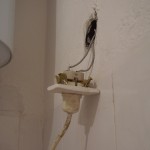 people who spend their holidays in Uzbekistan rather than Switzerland.
people who spend their holidays in Uzbekistan rather than Switzerland.
After fetching the car I went for a walk and to find a restaurant, because the hotel did not have one. The town was actually quite pleasant, with a renovated main street lined with Italian-style buildings, a cathedral, and a really beautiful new mosque next to my hotel. There were a huge number of bars and cafes, but it took me some time to find a proper restaurant. The food was ok and very cheap. By now it was dark, but contrary to some reports I had read, it appeared to be quite safe to walk around, and there were a lot of people on the streets. Promenading in the evening is a popular Albanian pastime.
At 5.30am the next morning I was woken by the call to prayer from the mosque next door. I did not go, and I don't think many other people did either, because after many years of state sponsored atheism there has not been a very strong religious revival in Albania. You see more people in Muslim dress in Britain.
Breakfast at the Rozafa was a somewhat slimmed-down version of that at the Verzaci, and again no drink was provided until I asked. There were apparently few other guests in the hotel, but as I would like to go to Uzbekistan I booked in for another night. There are actually two smaller but much better hotels in the centre of Shkroder, one of which is said to be of international standard.
After breakfast I set off on the only main road leading northwards towards Montenegro and the mountainous area where the blood feuds used to be. I had read that the 22 mile journey from Shkoder to the turn off up to the mountains would take 1½ hours, due to the state of the road, and that was not far out. The road goes to within 1 mile of the border with Montenegro, so I just drove along the side of Lake Shkoder as far as the border post, but there was nothing much to see, although the scenery in Montenegro looked good. Just on the Albanian side of the border was a 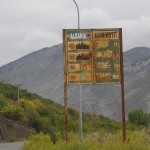 new filling station and café, so I went in for a cup of coffee. It was Sunday morning and there were five young men sitting at a table drinking. Although the blood feuds were normally reserved for members of the local clans, they looked at me in a manner that suggested that they might be thinking of broadening their horizons.
new filling station and café, so I went in for a cup of coffee. It was Sunday morning and there were five young men sitting at a table drinking. Although the blood feuds were normally reserved for members of the local clans, they looked at me in a manner that suggested that they might be thinking of broadening their horizons.
The road into the mountains became narrower after the first village and soon went down to single track with passing places and a fairly rough surface. It then began to climb, with endless hairpin bends and sheer drops. There was a low wall which was missing on the exit side of many of the bends in the downhill direction. I only went as far as the second village, because the road goes on for miles, and eventually becomes impassable for ordinary cars. Fortunately there was very little traffic, but there was a Mercedes with collapsed front suspension partly blocking the road.
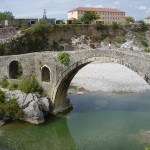 After retracing my route most of the way back to Shkroder I went to Ura e Mesit to look at Albania's best preserved Ottoman-era bridge, and then crossed the city and drove over a quaint single track bridge with wooden planks to a village called Shiroke with a beautiful view across the lake. Despite the lack of street names and direction signs it is not too difficult to find the way, especially in the countryside, because there are few made up roads.
After retracing my route most of the way back to Shkroder I went to Ura e Mesit to look at Albania's best preserved Ottoman-era bridge, and then crossed the city and drove over a quaint single track bridge with wooden planks to a village called Shiroke with a beautiful view across the lake. Despite the lack of street names and direction signs it is not too difficult to find the way, especially in the countryside, because there are few made up roads.
After surviving another night in the Rozafa I drove over the wooden bridge again and along the side of the lake to a fishing village called Zogaj. Although it was a scenic drive I would not do it again because the road was very narrow with endless bends and sheer drops into the lake, with little scope for evasive action in the event of meeting a lunatic local driver coming the other way.
At Lezhë I turned off the main road to a place called Shëngjin, which sounds as if it should be in China, but unfortunately it is not. It is my idea of The Seaside Resort from Hell (and I live in Bognor), with brightly-coloured 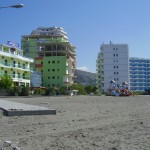 high-rise hotels going up at a great rate. The beach has dark brown sand covered with rubbish like much of the rest of Albania, and it is unlikely that the sea water quality would be anywhere near Blue Flag standard. A new access road has been built, and it is clear that before long Shëngjin will be appearing in the holiday brochures at home. A novel feature of the beach is a number of round concrete bunkers with domed tops. These were built all over the country by Hoxha, who lived in fear of being invaded. Most of them still exist, because they are difficult to remove, and they are used for various purposes, including, needless to say, for storing rubbish.
high-rise hotels going up at a great rate. The beach has dark brown sand covered with rubbish like much of the rest of Albania, and it is unlikely that the sea water quality would be anywhere near Blue Flag standard. A new access road has been built, and it is clear that before long Shëngjin will be appearing in the holiday brochures at home. A novel feature of the beach is a number of round concrete bunkers with domed tops. These were built all over the country by Hoxha, who lived in fear of being invaded. Most of them still exist, because they are difficult to remove, and they are used for various purposes, including, needless to say, for storing rubbish.
There is another seaside resort called Durrës not far from Tirana. An English couple I met on the airport bus after going to Tirana said if I went there I would be glad I lived in Bognor.
By the time I got back to Tirana airport the car was very dirty but otherwise had survived unscathed, and when the man from Avis eventually arrived he declared himself satisfied with it.
The purpose of my trip was to find out what Albania was like, and although I only skimmed the surface of the country I felt that I had seen and learned a lot. The people I met were mostly quite friendly and helpful, although the language is a major problem, as few speak English. Apparently the best foreign language to have is Italian, of which I have no knowledge at all. The Albanian language is rather strange, with lots of Qs and ës. The Albanian word for Albania is Shqiperise.
The country is changing fast, with new roads being built and buildings going up everywhere. Where the money comes from is a mystery, although they are desperate to get into the EU, so that they can spend our money improving their roads while ours get worse. It is hard to reconcile the reality of towns with poor medical facilities and no fire engines with the reality of people tearing about everywhere in big German cars. I did not experience any power cuts, but they obviously occur, because there are generators everywhere, with some shops having them on the pavement in front of their premises.
I don't think the country is as dangerous as it is sometimes made out to be. You are more likely to get wiped out on the road or electrocuted in your hotel than mugged or shot. However, if you want to go to a place where everything is nice, everything works, and people speak English, Albania is not for you.
The Albanian lek is a non-convertible currency, which means that it cannot be bought or sold through normal channels outside the country. I had bought a considerable amount at the airport when I arrived and needed to change back what I had left. I asked the lady on the British Airways desk where I could change it, and she pointed at a man standing nearby who looked like a rogue and said "He will do it, or you can do it at the bank".
The rogue rushed over and said "You want to change money?", and produced a bundle of notes larger than I would have imagined that anyone could hold in one hand. "Do you want euros, pounds or dollars?"
"Pounds"
"How much do you want?"
"Fourteen thousand two hundred lekë"
He tapped on his calculator. "I give you seventy-eight pounds"
"No, no. I want a hundred pounds".
"Impossible. I give you eighty pounds"
No, no, I will try at the bank"
"You can't, the bank closed at 6 o'clock."
With tears pouring down my face I accepted the eighty pounds. He shook my hand
and said he was looking forward to seeing me in Albania again. I am sure he was.